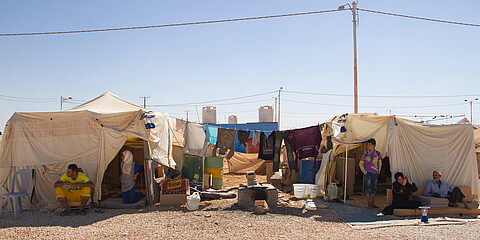
Effectiveness of German Development Cooperation in Dealing with Conflict-induced Forced Migration Crises
Wars and conflicts force millions of people worldwide to flee their homes. Within the framework of the German Government's 'Partnership for Prospects in the Middle East', DEval has investigated how short-term assistance and development cooperation can be meaningfully connected in order to improve the lives of both refugees and the local population in the host communities.
According to the United Nations High Commissioner for Refugees (UNHCR), at the end of 2019 the number of forcibly displaced persons was 79.5 million. Twenty-six million of them had been forced to flee their homes by conflicts or serious human rights violations, 6.6 million of these from Syria alone. Most of the latter were received by communities in the neighbouring countries, above all Turkey, Lebanon and Jordan.
To offer these refugees prospects beyond their situation of acute need, and give the vulnerable population in the receiving countries an opportunity to generate income, in early 2016 the German Government launched the 'Partnership for Prospects in the Middle East'. This includes cash-for-work projects that create short-term jobs and income-generating opportunities, and the payment of salaries for teachers to teach Syrian child refugees. A further component added recently involves interventions for vocational training and the promotion of business start-ups.
Taking the Partnership for Prospects in the Middle East as an example, DEval is investigating how short-term assistance and development cooperation can be effectively combined. It aims to determine which interventions and instruments are suitable for mitigating the effects of crises on both refugees and the host communities, and for improving people’s lives sustainably.
Objectives of the Evaluation
The evaluation focuses on effectively bridging the gap between short-term assistance and development cooperation as a potential success factor for effective development cooperation to deal with conflict-induced forced migration crises.
Background
DEval is evaluating the effectiveness of German development cooperation in conflict-induced forced migration crises, taking the Partnership for Prospects in the Middle East as an example. The evaluation focuses on the effectiveness of the Partnership's contributions towards creating prospects for refugees in Syria's neighbouring countries. It addresses the key question of under which conditions, and with which instruments and approaches, the Partnership can deliver effective contributions towards mitigating the effects of the crisis on refugees and host communities, and translate this into long-term impacts.
In the first quarter of 2018 a literature review was published as a preparatory product of the evaluation, entitled: 'Building Bridges between International Humanitarian and Development Responses to Forced Migration'. The study systematically analyses the literature on combining international humanitarian assistance with development cooperation. The evaluation focuses on this effective interlinkage as a possible success factor for effective development cooperation to deal with conflict-induced forced migration crises.
Methods
The evaluation applies a combination of different methods, including rigorous impact measurements in conjunction with a quasi-experimental design involving two phases of surveys among a large number of refugees and other vulnerable target groups in Jordan and Turkey.
Team
- Helge Roxin Senior Evaluator - Team Leader
- Dr Alexander Kocks Evaluator - Team Leader
- Ruben Wedel Former Evaluator DEval
- Dr Nico Herforth Former Evaluator DEval
- Dr Thomas Wencker Senior Evaluator - Team Leader
Contact
Helge Roxin
Phone: +49 (0)228 336907-937
E-mail: helge.roxin@DEval.org
Dr Stefan Leiderer
Phone: +49 (0)228 336907-940
E-mail: stefan.leiderer@DEval.org
Publications
- Die Wirksamkeit deutscher Entwicklungszusammenarbeit bei konfliktbedingten Fluchtkrisen. Die Beschäftigungsoffensive Nahost
- The strategic dimension of the humanitarian-development gap – conceptual claims and empirical evidence
- Bridging the gap between humanitarian and development aid - the case of Syria
- Building Bridges Between International Humanitarian and Development Responses to Forced Migration
